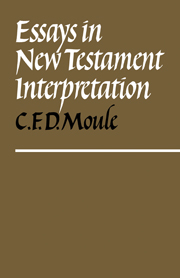Book contents
- Frontmatter
- Contents
- Foreword
- Acknowledgements
- Abbreviations
- Jesus in early Christian interpretation
- Studies in the Gospels
- Two studies in the Epistles
- Two linguistic studies
- Studies exegetical, doctrinal and ethical
- 12 The influence of circumstances on the use of christological terms
- 13 The influence of circumstances on the use of eschatological terms
- 14 St Paul and ‘dualism’: the Pauline conception of resurrection
- 15 A reconsideration of the context of maranatha
- 16 II Cor. iii.18b, καθάπερ ἀπὸ κυρίου πνεύματος
- 17 Punishment and retribution: an attempt to delimit their scope in New Testament thought
- 18 The theology of forgiveness
- 19 Obligation in the ethic of Paul
- 20 ‘…As we forgive…’: a note on the distinction between deserts and capacity in the understanding of forgiveness
- 21 The sacrifice of the People of God
- Index
21 - The sacrifice of the People of God
Published online by Cambridge University Press: 05 November 2011
- Frontmatter
- Contents
- Foreword
- Acknowledgements
- Abbreviations
- Jesus in early Christian interpretation
- Studies in the Gospels
- Two studies in the Epistles
- Two linguistic studies
- Studies exegetical, doctrinal and ethical
- 12 The influence of circumstances on the use of christological terms
- 13 The influence of circumstances on the use of eschatological terms
- 14 St Paul and ‘dualism’: the Pauline conception of resurrection
- 15 A reconsideration of the context of maranatha
- 16 II Cor. iii.18b, καθάπερ ἀπὸ κυρίου πνεύματος
- 17 Punishment and retribution: an attempt to delimit their scope in New Testament thought
- 18 The theology of forgiveness
- 19 Obligation in the ethic of Paul
- 20 ‘…As we forgive…’: a note on the distinction between deserts and capacity in the understanding of forgiveness
- 21 The sacrifice of the People of God
- Index
Summary
I am proposing, in this paper, to discuss the place of giving, in contrast to receiving, in Christian life and worship generally; and only within this very general field, to discuss the place and function of sacrifice – and within this, in turn, of Eucharistic sacrifice. I have reached this decision with considerable hesitation, knowing my incompetence in so vast a question; but nevertheless with some conviction, partly because discussion with other contributors has suggested this division of functions, but partly also because it seems to me that a great deal of discussion on the more strictly liturgical level is confused by reason of an unrecognized confusion at the more fundamental level of the subject I have named. For instance – to take only one recent example – 1 am on almost every page perplexed by Max Thurian's suggestive and deeply devout work on the Eucharistic Memorial, because (as it seems to me) he does not first squarely face the most basic implications of the ideas with which he is associating anamnēsis, mnēmosunon, and the rest.
At the risk, then, of doing something stupid and unconstructive, I want to pose some radical questions, such as whether (despite the witness of the New Testament itself) the words ‘sacrifice’, ‘intercession’, and ‘pleading’ have any logical place at all within the language of Christian atonement-doctrine; and, as I say, to look at these questions in the light of an even more general consideration of the place of giving, as contrasted with receiving, in the Christian understanding of God and man.
- Type
- Chapter
- Information
- Essays in New Testament Interpretation , pp. 287 - 298Publisher: Cambridge University PressPrint publication year: 1982



